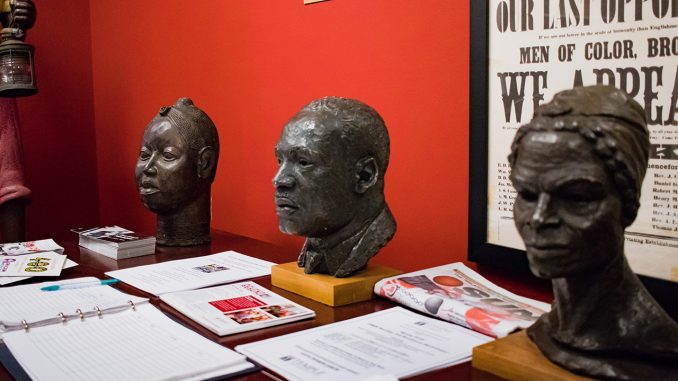
African-American history and American history are inseparable.
Temple University’s Charles L. Blockson Afro-American Collection tells these entangled stories of the Black experience in the United States through more than 500,000 African and African-American objects, documents and other resources.
August will mark the 400th anniversary of African captives from a Portuguese slave ship arriving to Jamestown in colonial Virginia in 1619. The collection features several items from this time period to tell this often overlooked story.
“The history of struggle and everything African-Americans had to go through…speaks to the spirit of resilience,” said Diane Turner, the Blockson Collection’s curator. “It also speaks to a spirit of unity and cooperation and love and faith.”
Despite the centuries-long presence of African and African American influence on the nation’s history, the narrative often gets left out of history courses outside of slavery, the Civil War and the civil rights movement. Likewise, while media representations of Black identity can be sparse or even harmful, one of the roles of the Blockson Collection is to correct the narrative, Turner said.
“In the era of fake news and social media, people have an opportunity to come in and do research and find out info that’s factual,” Turner said. “Here you can find out things that are neglected by mainstream media.”
The Blockson Collection is free and open to the public in Sullivan Hall.
Aaron X. Smith, an Africology and African-American Studies professor, said the Blockson Collection provides important education about not just African-American history, but American history and world history.
“History is like a compass and a clock telling people where they should go,” Smith said. “If you don’t understand the contributions of Africans, then you are just ignorant to history and reality and the contributions that made America what it is.”
Tarik Richardson, an Africology and African American Studies master’s student, called the Blockson Collection “a place of understanding.”
“It’s hard to respect someone if you don’t understand them,” Richardson said.
People can start to understand Black history by viewing the pieces in the collection and educating themselves on teachings by African-American scholars, Richardson added.
Maulana Karenga, the Africana studies department chair at California State University Long Beach, is a scholar who discusses multicultural education and learning about different cultures to help individuals become better citizens, Richardson added.
Karenga’s work, including the “Handbook of Black Studies,” which he co-edited with Temple’s Africology and African American Studies department chair Molefi Kete Asante, is available at the Blockson Collection.
“If this collection didn’t exist, where would people go to find information about our ancestors or communities?” Richardson said. “Where would people turn to get the documents of different African-Americans that lived in Philadelphia?”
“The value that it has is really intrinsic to providing knowledge to fight against miseducation,” he added.
Going forward, the Blockson Collection will add to its music collection, placing an emphasis on hip-hop materials. In Fall 2018, the collection added items like handwritten lyrics from late rapper Tupac Shakur.
“The roots [of hip hop] come out of Philadelphia,” Turner said. “Philly has beyond jazz, a very rich music history.”
While conversations about Black history tend to surface in February in conjunction with Black History Month, the resilience of Black Americans should be celebrated all of the time, she added.
“We do Black history 365 days a year,” Turner said.


Be the first to comment